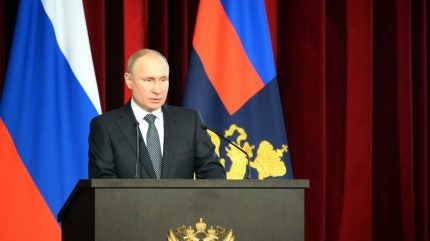
The US, along with an international coalition of more than 30 allies and partners, has imposed sweeping sanctions, export controls and other economic measures since the start of Russia’s war against Ukraine.
These measures have made it harder and costlier for the Kremlin to obtain the capital, materials, technology and support it needs to sustain its war of aggression.

Discover B2B Marketing That Performs
Combine business intelligence and editorial excellence to reach engaged professionals across 36 leading media platforms.
A vast suite of sanctions
Since Russia’s full-scale invasion of Ukraine, the US Government has unleashed more than 300 sanctions on the Russian economy.
“From the beginning of President Vladimir Putin’s illegal and unprovoked war, our global coalition has focused on supporting Ukraine while degrading Russia’s ability to conduct its invasion,” said Secretary of the US Treasury Janet L Yellen in a press release in late May.
“Our collective efforts have cut Russia off from key inputs it needs to equip its military and is drastically limiting the revenue the Kremlin receives to fund its war machine,” she added. “Today’s actions will further tighten the vice on Putin’s ability to wage his barbaric invasion and will advance our global efforts to cut off Russian attempts to evade sanctions.”
Indeed, the Treasury’s Office of Foreign Assets Control (OFAC) has added more than 2,500 Russia-related targets to the Specially Designated Nationals and Blocked Persons list since February 2022, including approximately 2,400 individuals and entities, 115 vessels and 19 aircraft.

US Tariffs are shifting - will you react or anticipate?
Don’t let policy changes catch you off guard. Stay proactive with real-time data and expert analysis.
By GlobalDataThose designated range from senior Russian Government officials, including Putin, to high-net-worth individuals whose wealth is tied to the Russian state, leaders in revenue-generating sectors and supporters of the military-industrial complex.
Meanwhile, more than 80% of Russia’s banking sector by assets are under US sanctions, including the top ten Russian-owned banks, while all members of the Russian State Duma (450) and the Federation Council (170) have been sanctioned, as well as 47 Russian governors.
The US has also played a key role in the G7’s price caps on Russian-origin oil and petroleum products, a tool that has effectively reduced the revenue Russia receives to fund its war in Ukraine, while also supporting energy market stability.
US private sector continues to let the side down
The aforementioned sanctions, which are but a snapshot, have had an enormous impact on the Russian economy, and across almost all sectors.
There has also been a very significant corporate exodus from Russia, which has seen more than 1,000 multinationals leave or curtail their operations in the country. And yet, foreign companies still made $214bn in Russia in 2022, $14.1bn of which was profit, which means that companies paid the Kremlin $3.1bn in profit tax on those takings. And this is only the tip of the iceberg and likely a substantial underestimate of the total tax bill, according to the the Business of Staying report from B4Ukraine and the Kyiv School of Economics.
When taking a look at these figures on a country basis, it is US companies that saw the largest total revenues in Russia, thereby making them the biggest contributors to the Kremlin’s coffers through taxes on profits, paying $712m in 2022. An awkward fact for Washington. Meanwhile, companies headquartered in G7 and EU countries were cumulatively the highest profit taxpayers in Russia in 2022, representing 16 of the top 20 national contributors.
Among the G7 countries, US companies have left in fairly high numbers, proportionately speaking, while Italian and French companies have lagged way behind.
Nonetheless, if the US (and the G7 more generally) is to be taken seriously in its punitive measures against the Kremlin, then more pressure is needed over European and US companies that are still doing business as usual in Russia, or simply lying about their departure from the country.


